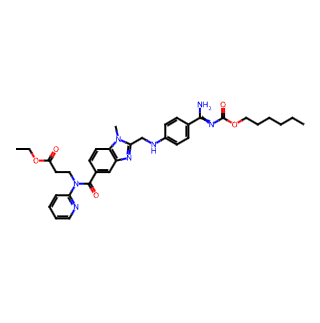- Synthetic anti-infective drugs
- Medications for the digestive system
- Antipyretic and analgesic drugs
- Medications for the blood system
- Medications for the respiratory system
- Anti-allergic drugs
- Medications for the urinary system
- Diagnostic medications
- Immunosuppressive and immunomodulatory drugs
- Vitamins and mineral supplements
- Antioxidants and medications for osteoporosis
- Antiparasitic drugs
- Ophthalmic medications
- Amino acids and their derivatives
- Dermatological medications
- Medications for the circulatory system
- Antitumor drugs
- Medications for the nervous system
- Hormonal and endocrine function-regulating drugs
- Antibiotics
- Others
CAS NO.: 211915-06-9




Dabigatran Etexilate
Dabigatran Etexilate is a small molecule prodrug with oral bioavailability, primarily used for the prevention of venous thromboembolism and stroke caused by atrial fibrillation (AF). Here's a detailed introduction to Dabigatran Etexilate:
Basic Information
English Name: Dabigatran Etexilate
Alternative Names: Dabigatran etexilate mesylate
CAS Number: 211915-06-9
Chemical Structure: It is a prodrug of Dabigatran, a direct thrombin inhibitor, that is metabolized in the body to form the active molecule.
Pharmacological Action
Anticoagulant Effect: Dabigatran Etexilate exhibits significant anticoagulant effects by inhibiting the activity of thrombin, thus preventing blood coagulation.
Indications: Primarily used for the prevention of stroke and systemic embolism (SEE) in adult patients with non-valvular atrial fibrillation, particularly those with high-risk factors such as prior stroke, transient ischemic attack, reduced left ventricular ejection fraction, advanced age, diabetes, coronary artery disease, or hypertension.
Precautions
Bleeding Risk: The primary adverse effect of Dabigatran Etexilate is bleeding, including postoperative wound bleeding, skin, and mucous membrane bleeding. Therefore, close monitoring of the patient's bleeding status is necessary during treatment.
Contraindications: Includes severe renal impairment (creatinine clearance <30 ml/min), patients with clinically significant active bleeding, patients with hepatic disease and coagulation abnormalities that confer a risk of clinically relevant bleeding.
Drug Interactions: Concurrent use of anticoagulants, antiplatelet drugs, and NSAIDs may increase the risk of bleeding. P-glycoprotein inhibitors such as rifampin, verapamil, clarithromycin may reduce its efficacy.
Storage and Transportation
Storage Conditions: Generally recommended to be stored in a dry, cool place, protected from direct sunlight and high temperatures. Specific storage conditions may vary based on product batches and packaging requirements.
Transportation Conditions: During transportation, ensure the product is maintained under appropriate temperature and humidity conditions, avoiding severe shocks and compression.
Clinical Studies
Dabigatran Etexilate has demonstrated good anticoagulant efficacy and safety in multiple clinical studies. For instance, in pivotal studies on stroke prevention in AF patients, Dabigatran Etexilate significantly reduced the incidence of thrombotic events.
In summary, Dabigatran Etexilate is an essential anticoagulant drug with significant efficacy in preventing stroke and SEE in AF patients. However, close monitoring of bleeding, attention to drug interactions and contraindications is crucial during its use.

Tai Yau Street, San Po Kong, Kowloon, Hong Kong, China.



